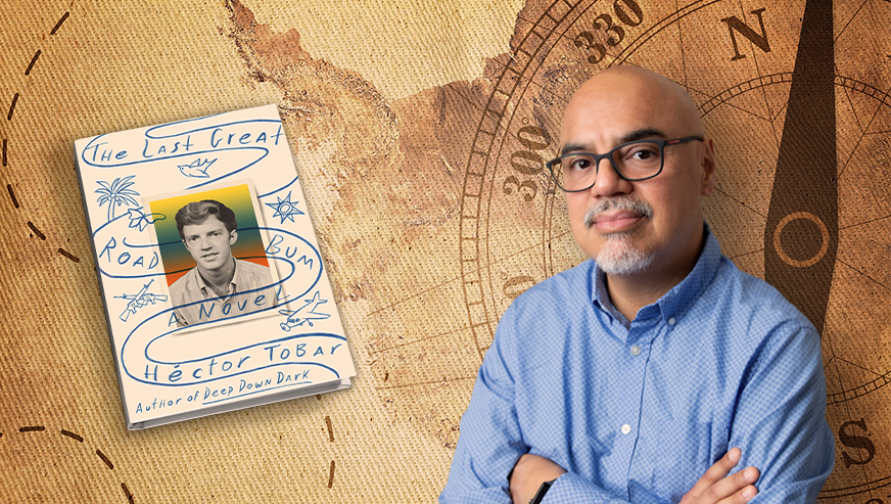
By Megan Cole
On paper, UCI Literary Journalism and Chicano/Latino Studies Associate Professor Héctor Tobar doesn’t have much in common with Joe Sanderson, whose life story Tobar has fictionalized in his latest novel, The Last Great Road Bum (Farrar, Straus & Giroux, 2020). Tobar is the Generation X son of Guatemalan immigrants; Sanderson was a blond, blue-eyed Baby Boomer from Illinois. Tobar, an alumnus of UCI’s M.F.A. Programs in Writing (fiction), is a Pulitzer Prize-winning journalist and author; Sanderson, an aspiring novelist and nomad, dropped out of college in the 1960s to scour the world for stories to immortalize. While Tobar was coming of age in Los Angeles, Sanderson was heading to civil-war-torn El Salvador, where he became one of two Americans to fight alongside Salvadoran guerillas against the U.S.-supported military junta. Sanderson died there in combat in 1982, at age 39, before ever finishing his semi-autobiographical novel; in The Last Great Road Bum, Tobar tells the story that Sanderson never could.
Due to their differences in age, race and life experience, Tobar says, people often wonder why he chose “a little-known gringo from Urbana” as the subject of his novel — perhaps, in the process, flouting the creative writing imperative to “write what you know.” But for a seasoned reporter like Tobar, who has interviewed everyone from U.S. presidents to homeless Angelenos to Argentine death squad survivors, adopting unfamiliar perspectives is par for the course.
“I often tell my literary journalism students that the idea of ‘writing what you know’ requires writing with authority, and authority comes from really knowing your subjects,” Tobar explains. “We learn as journalists that if you can listen to someone, absorb their story, then you can become them on the page — tell a story very, very close to their point of view, and see the world the way that they do. With fiction, and even journalistic writing, part of our responsibility is to accurately transport people someplace, to create this dream of being somewhere else, being someone else.”
For Tobar, reconstructing the events of Sanderson’s short yet exuberant life has been no straightforward feat. Twelve years ago, his research assistant stumbled across the germ of Sanderson’s story — some war diaries preserved by one of Sanderson’s Salvadoran comrades — in a San Salvador museum. He referred the diaries to Tobar, who was then the Mexico City bureau chief at the Los Angeles Times, where Tobar first told Sanderson’s story in a 2008 column.
Tobar knew “immediately, without a doubt” that Sanderson’s odyssey merited a deeper telling, but it took time to unearth the full story, since Sanderson’s meandering notebooks were “largely unreadable” and filled with obscure references. While mulling the notebooks over, Tobar penned two other books: The Barbarian Nurseries, a novel about an affluent L.A. family and their undocumented live-in maid; and Deep Down Dark, a New York Times best-selling non-fictional account of the 2010 Chilean mining disaster. But even while immersed in these other projects, he couldn’t stop thinking about Sanderson.
“Joe was someone who wanted to write a novel his whole life, so I finally thought, why not write a book about a guy who tried to live his life like a character in a novel, but never managed to write one?” says Tobar. “I would write his novel for him.”
Though The Last Great Road Bum is fictional, it is undergirded by a detailed factual framework — the mark of Tobar’s quarter-century of journalistic training. Before writing the novel, Tobar extensively interviewed Sanderson’s family, friends and ex-love interests; spent time with Sanderson’s former comrades in the Salvadoran guerilla army; pored over hundreds of pages of diaries and letters; and even travelled to many of the locales dearest to Sanderson. The intense research process, Tobar says, allowed him to immerse himself in the world of his protagonist — to “find points of identification with Sanderson...and really enter into his mind on the page, filling in the sensual details of his world, his imagination and his spirit.”
Especially now, the capacity of fiction to reveal life through the eyes of another — to understand the differences in our experiences, to discover commonalities and contradictions — cannot be underestimated, says Tobar. And Sanderson’s unique story offers readers not just an escape from contemporary life, but an opportunity to reflect on it.
“The world has changed tremendously since Joe lived and died in it,” says Tobar. “Ultimately, The Last Great Road Bum is meant to transport you to a space where you can contemplate those changes since the ’60s and ’80s, plus what it’s meant to be an American, and what the role of the U.S. is in a world with struggles and injustices — in a diverse world.”
Officially out August 25, 2020, The Last Great Road Bum is available for pre-purchase now.
Follow Tobar on Twitter @TobarWriter.
